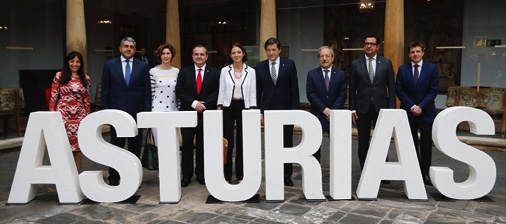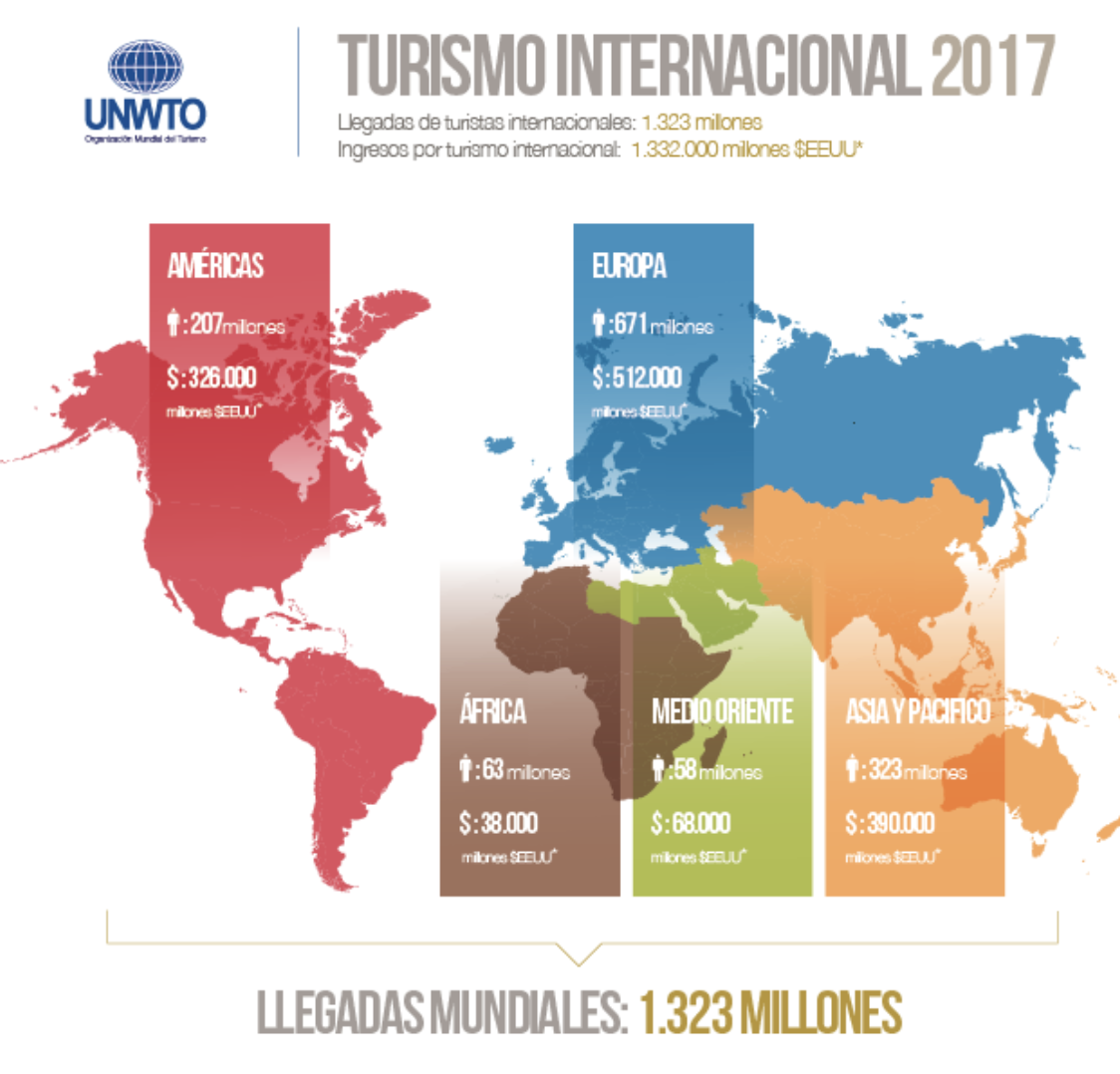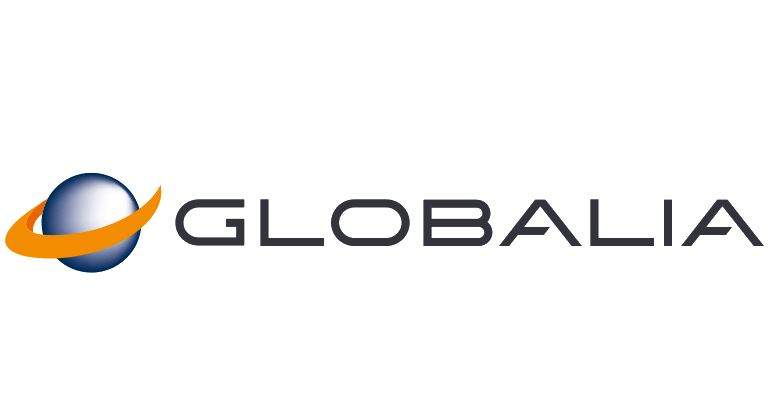

UNWTO: Use technology for more sustainable tourism management
As the World Tourism Organization (UNWTO) held its 2nd World Conference on Smart Destinations in the Spanish city of Oviedo (25-27 June 2018), Secretary-General Zurab Pololikashvili emphasized how new technologies can and should enable a more universal approach to sustainable tourism.
“Technology helps us to better manage our social, cultural and environmental impacts. And if well managed, tourism can act as an agent of positive change for more sustainable lifestyles, destinations, and consumption and production patterns”, said Mr. Pololikashvili opening the Conference.
This year’s event featured two days of seminars detailing destinations’ routes towards effective digitalization. It shone a spotlight on how destinations can use technological advances like big data and geo-localization to spur sustainable management of tourism.
The Conference provided concrete take-aways for participants and also fostered knowledge creation and exchange. It was preceded by the 1st Hackathon for Smart Destinations (23-24 June) and a research and development day (25 June), which brought startups and academics together to work on ways to bring smart, innovative and sustainable solutions to the sector. These events also highlighted that several forward-thinking governments, private sector entities, researchers and technology centres have already taken the lead in doing so.
The 2nd World Conference on Smart Destinations was organized by UNWTO, the Spanish Ministry of Industry, Trade and Tourism and the Government of Asturias, with the collaboration of Minube.
The World Tourism Organization (UNWTO) is the United Nations agency responsible for the promotion of responsible, sustainable and universally accessible tourism. It is the leading international organization in the field of tourism, which promotes tourism as a driver of economic growth, inclusive development and environmental sustainability and offers leadership and support to the sector in advancing knowledge and tourism policies worldwide. It serves as a global forum for tourism policy issues and a practical source of tourism knowledge. It encourages the implementation of the Global Code of Ethics for Tourism to maximize the contribution of tourism to socio-economic development, while minimizing its possible negative impacts, and is committed to promoting tourism as an instrument in achieving the United Nations Sustainable Development Goals (SDGs), geared towards eliminating poverty and fostering sustainable development and peace worldwide.
UNWTO generates market knowledge, promotes competitive and sustainable tourism policies and instruments, fosters tourism education and training, and works to make tourism an effective tool for development through technical assistance projects in over 100 countries around the world.
UNWTO’s membership includes 156 countries, 6 territories and over 500 affiliate members representing the private sector, educational institutions, tourism associations and local tourism authorities. Its headquarters are located in Madrid.

International Tourism exceeds expectations in the first months of 2018
Madrid, Spain, 26 June 2018 – International tourist arrivals grew 6% in the first four months of 2018, compared to the same period last year, not only continuing the strong 2017 trend, but exceeding UNWTO’s forecast for 2018.
Growth was led by Asia and the Pacific (+8%) and Europe (+7%). Africa (+6%), the Middle East (+4%) and the Americas (+3%) also recorded sound results. Earlier this year, UNWTO’s forecast for 2018 was between 4-5%.
“International tourism continues to show significant growth worldwide, and this translates into job creation in many economies. This growth reminds us of the need to increase our capacity to develop and manage tourism in a sustainable way, building smart destinations and making the most of technology and innovation”, said UNWTO Secretary-General, Zurab Pololikashvili.
Asia and Europe led growth at the start of 2018
From January to April 2018, international arrivals increased in all regions, led by Asia and the Pacific (+8%), with South-East Asia (+10%) and South Asia (+9%) driving results.
The world’s largest tourism region, Europe also performed strongly during this four-month period (+7%), pulled ahead by the destinations of Southern and Mediterranean Europe, and Western Europe (both +8%).
Growth in the Americas is estimated at 3%, with strongest results in South America (+8%). The Caribbean (-9%) is the only sub-region to experience a decrease in arrivals during this period, weighed down by some destinations still struggling with the aftermath of the hurricanes of August and September 2017.
The limited information coming from Africa and the Middle East points to 6% and 4% growth, respectively, confirming the rebound of Middle East destinations and the consolidation of the growth in Africa.
Confidence in global tourism remains strong according to the latest UNWTO Panel of Tourism Experts survey. The Panel’s outlook for the May-August period is one the most optimistic in a decade, led by the particularly upbeat sentiment in Africa, the Middle East and Europe. Experts’ evaluation of tourism performance in the first four months of 2018 was also robust, in line with the strong results recorded in many destinations around the world.

World Tourism Organization and Globalia announce the first and largest worldwide competition for tourism startups
This pioneering initiative for the tourism sector reaches out to 164 countries to find startups aiming to transform tourism.
Whether tech-based or non-technological, early-stage or more mature, any startup with innovative ideas capable of revolutionizing the way we travel and enjoy tourism is welcome to participate.
The tourism sector has taken a giant step into the future. The World Tourism Organization (UNWTO), in partnership with Globalia, the leading tourism group in Spain and Latin America, announced the launch of the 1st UNWTO Tourism Startup Competition. It is the world’s first and largest initiative devoted to identifying new companies that will lead the transformation of the tourism sector. In order to find the best projects, the call for competitors will be launched in 164 countries.
The objective of the programme is to select the best solutions and the most disruptive projects. The search will focus on finding pioneering proposals for implementation of emerging and disruptive technologies, as well as on startups based on new business models, such as the circular economy. In this regard, one of the pillars of this competition is to give visibility to projects that are committed to enhancing sustainability in tourism.
The startup search process is as ambitious as it is complex: identifying the best projects in all corners of the planet. For this, UNWTO and Globalia have enlisted the innovation consultancy firm Barrabés.biz, which boasts more than 20 years’ experience in the creation, connection and activation of entrepreneurship and innovation ecosystems.
To broaden the scope of the competition and to facilitate the registration of interested startups, the programme will be implemented through the digital platform YouNoodle, a leading Silicon Valley company in the startup evaluation space at the global level.
“Innovation and tourism investment are not ends in themselves; they are means to develop better tourism products, to improve the governance of tourism and to make the most of the proven sustainability of tourism, by creating jobs and generating opportunities,” said UNWTO Secretary-General Zurab Pololikashvili.
For his part, Globalia CEO Javier Hidalgo confirmed his company’s support for this new initiative emphasizing that “as a global tourism group, we want to offer the winners the opportunity to work with us and transform the sector together”.
Who can participate?
To participate in this global competition, startups must present business models that are related to at least one of four main areas:
The future of travel
The tourism experience
Environmental impact
Community development
Those interested in participating can find more information and submit their applications through the programme’s website at www.tourismstartups.org. Applications are open from 26 June to 3 September 2018. The projects will be evaluated according to five criteria: uniqueness and viability of the solution, potential impact, business model, scalability and team profile. A jury will evaluate the entries and select the best projects as semi-finalists to be announced in September 2018.
The winners of this competition will have the opportunity to be part of the leading companies in the tourism sector.
